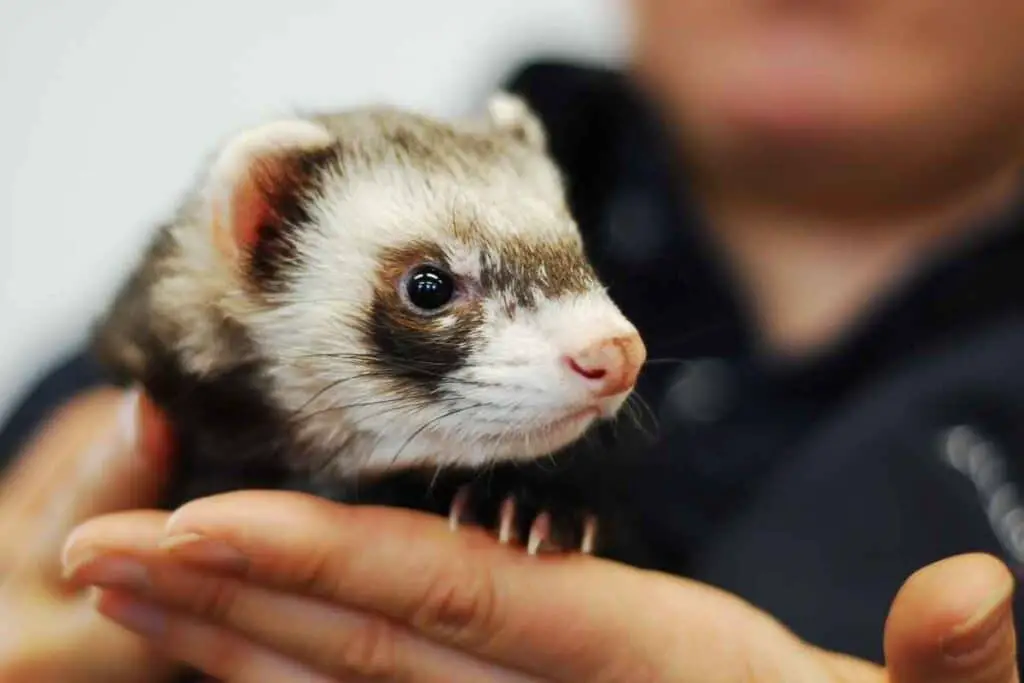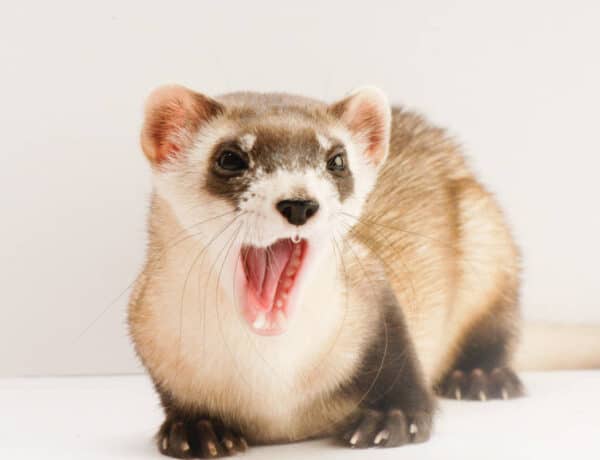Introduction
How To Raise A Ferret: Ferrets, those charming and mischievous little creatures, have captured the hearts of pet enthusiasts around the world with their playful antics and endearing personalities. If you’re considering welcoming a ferret care into your home or have already made that decision, you’re in for a unique and rewarding experience. However, like any pet, ferrets weather require dedicated care, attention, and a nurturing environment to thrive. Ferrets, scientifically known as Mustela putorius, are domesticated relatives of the European polecat. They are known for their long, slender bodies, inquisitive nature, and boundless energy. While they may be small in size, their personalities are anything but, making them popular choices among animal lovers.
We will cover all aspects of ferret care, from the very basics to advanced tips for ensuring a happy and healthy life for your ferret companion. You will learn about their unique dietary requirements, suitable housing options, and the importance of socialization. We will also into ferret-proofing your home to keep them safe and discuss grooming and hygiene practices that will keep your pet looking and feeling their best. We will have regular veterinary care, common health issues that ferrets may face, and how to spot early signs of illness. Understanding these aspects of ferret care will empower you to be a responsible and attentive ferret owner.
Whether you’re a first-time ferret owner or an experienced enthusiast looking to enhance your, it will serve as your go-to resource. We will have the information you need to create a loving and stimulating environment for your ferret, strengthening the bond between you and your new furry friend. So, let’s embark on this ferret-raising journey together, ensuring that your ferret’s life is filled with joy, comfort, and the best care possible.

Are ferrets good pets for beginners?
Are ferrets a good pet? They are lively, curious and fun-loving pets, and they’re very social. This means that they can make great pets, but they’re not the easiest to handle and can bite hard if startled. So they don’t always make good pets for children.
Specialized Care: Ferrets have specific dietary, housing, and grooming needs that may be challenging for beginners to understand and manage. They require a diet high in animal protein, a safe and ferret-proofed living space, and regular grooming to prevent odor and maintain their health.
Energetic: Ferrets have boundless energy, and they need ample playtime and mental stimulation. Failure to provide sufficient activity can result in boredom-related behaviors, such as digging or chewing.
Health Concerns: Ferrets are susceptible to certain health issues, including adrenal gland disease and insulinoma. Regular veterinary care and potential medical expenses should be factored into your decision.
Odor Control: Ferrets have a distinct musky odor that can be bothersome to some people. While proper grooming and cage cleaning can help control this odor, it’s essential to be aware of it.
What do ferrets need to survive as a pet?
Ferrets need a large hutch to live in that is safe and secure. It needs an area that protects them from the weather and provides enough space for exercise. A suitable hutch design includes a waterproof, dark, dry area for the ferrets to rest and hide with a bedding of soft hay or shredded paper.
Ferrets need a safe and comfortable living space. A multi-level ferret cage with ramps, hammocks, and hiding spots is ideal. Ensure that the cage is spacious enough to allow for exercise and exploration. Ferrets should not be kept in small enclosures for extended periods.
Ferrets are highly social animals that thrive on human interaction and the company of other ferrets. If possible, consider having more than one ferret to provide companionship. Regular playtime and handling are crucial for their mental and emotional well-being.
Ferrets are intelligent and curious creatures. They require mental stimulation and enrichment to prevent boredom. Provide them with toys, tunnels, and puzzles to keep their minds active and engaged.
Regular veterinary check-ups are crucial to monitor your ferret’s health and detect any potential issues early. Vaccinations against diseases like distemper are essential. Be prepared for potential medical expenses, as ferrets can be prone to certain health conditions.
What do pet ferrets eat?
Ferrets are obligate carnivores, which means they must eat meat. Raw meat is the best option, including whole prey. Ferrets can also eat kitten food, as it has a high meat protein content, baby food that’s high in meat protein, and dried ferret food, that’s high in meat protein.
Commercial ferret food is specifically formulated to meet the nutritional needs of ferrets. Look for high-quality ferret food brands that list meat or poultry as the first ingredient. Avoid generic cat foods or dog foods, as they don’t provide the necessary protein levels and nutrients for ferrets.
Some high-quality kitten foods can be suitable for ferrets as well. These foods are typically rich in animal protein and fat, which are essential for ferret health.
Ensure that the kitten food you choose contains at least 30-40% protein and 15-20% fat.
Some ferret owners choose to feed their pets a raw meat diet, which closely mimics their natural diet. This diet can include raw chicken wings, necks, and small rodents. If you opt for a raw meat diet, consult with a veterinarian experienced in ferret care to ensure it’s nutritionally balanced.
Access to clean, fresh water is crucial for your ferret’s hydration. Make sure your ferret always has access to water, and change it daily to keep it fresh.
You can occasionally offer your ferret treats, but they should be used sparingly. Ferret-specific treats are available, or you can provide small portions of cooked meats like chicken or turkey as an occasional treat.
What human foods can ferrets eat?
Wondering what human food ferrets can eat? Apart from a little cooked meat or half a boiled egg as a treat, ferrets should NEVER be given human foods. Ferrets are well designed to digest fats and protein but struggle with carbohydrates (found in starchy foods such as bread and potato) and large amounts of plant matter.
A small amount of unseasoned chicken or beef broth can be added to your ferret’s food or offered as a treat. Be cautious about the sodium content in store-bought broths and opt for low-sodium varieties if available.
Ferrets can tolerate small amounts of plain Greek yogurt as it contains probiotics that can benefit their digestive system. However, some ferrets may be lactose intolerant, so introduce yogurt slowly and monitor their response.
There are commercial ferret treats available in pet stores that are specifically formulated for ferrets. These treats are designed to meet their dietary needs and can be given in moderation.
Ferretone is a vitamin supplement and treat designed for ferrets. It’s often used as an occasional treat, but be mindful not to overfeed it, as it is high in fat.
Some meat-based baby foods, without added sugars, spices, or vegetables, can be offered to ferrets as an occasional treat. Ensure the ingredients list includes only meat and water.
Can a ferret love you?
Ferrets may be tiny, but they pack big personalities into small packages. These guys can be extremely loving and cuddly with their humans. Of course, it takes time to form that special friendship.
Cuddling and Nuzzling: Ferrets often enjoy physical contact with their owners. They may snuggle up against you, nuzzle your face or hands, or even try to crawl into your clothing for warmth and comfort. These behaviors are signs of trust and affection.
Playfulness: Ferrets are naturally playful creatures, and they often engage in games and roughhousing with their owners. This interaction is a form of bonding and demonstrates their comfort and trust in your presence.
Following You Around: Ferrets are curious animals, and they are known to follow their owners around the house, exploring alongside them. This behavior can be seen as a sign of attachment and the desire to be close to you.
Purring and Chirping: Ferrets sometimes make soft purring or chirping sounds when they are content and relaxed, especially during cuddle sessions. These vocalizations are often interpreted as expressions of happiness and attachment.
Do ferrets bite hurt?
It’s worth noting that the ferret’s skin is thicker and tougher than human skin, so when ferrets nip at each other in play, they don’t inflict any real pain. But when they nip at a human, it can hurt.
Ferrets, like humans, have distinct personalities. Some ferrets may be naturally more prone to nipping or biting, while others are gentler and less likely to bite.
Socialization plays a crucial role in a ferret’s behavior. Ferrets that have been well-socialized from a young age tend to be more comfortable around humans and are less likely to bite out of fear or aggression.
A ferret may bite if it feels threatened, scared, or cornered. In such cases, the bite may be more painful and defensive in nature. Ferrets may also bite when they are in pain or discomfort, such as if they have an injury or health issue. It’s essential to handle your ferret gently and be aware of any signs of distress.
Proper training and socialization are key to reducing the likelihood of painful bites. Handling your ferret regularly, exposing them to different people and environments, and teaching bite inhibition can all help reduce the risk of aggressive biting.
Bite inhibition is the ability of a ferret to control the force of its bite. Through gentle training and play, ferrets can learn not to bite hard. When a ferret is playing and accidentally nips too hard, it’s crucial to respond with a yelp or a vocal cue to let the ferret know it hurt you. This mimics how ferrets communicate with each other, and they learn to adjust their bite force accordingly.
Do ferrets love owners?
While ferrets are not for everyone, they can make great pets for the right owner. They are affectionate and bond with their owners, quiet for a large part of the day, and there are few pets as playful as ferrets.
Cuddling and Nestling: Ferrets enjoy snuggling up against their owners, nuzzling their faces or hands, and seeking physical closeness. This behavior is a clear indication of their trust and affection.
Playfulness: Ferrets are naturally playful animals, and they often engage in interactive play with their owners. They may chase, wrestle, or engage in playful nips, which is their way of bonding and demonstrating comfort and trust.
Following You Around: Ferrets are curious creatures and frequently follow their owners around the house. This behavior is a sign of their desire to be close to you and their interest in your activities.
Purring and Chirping: Ferrets can emit soft purring or chirping sounds when they are content and relaxed, especially during cuddle sessions. These vocalizations are often seen as expressions of happiness and attachment.
How many hours should a ferret play?
Exercise. Ferrets are energetic, social animals that require a great deal of play and interaction. At a minimum, ferrets need 2 to 4 hours every day outside their cage to remain healthy.
Ferrets should ideally have at least 3 to 4 hours of playtime outside their cage every day. This playtime should be interactive and engaging, allowing them to explore, run, and engage in activities that mimic their natural behaviors.
While to provide daily playtime, this can be broken down into shorter play sessions throughout the day. Ferrets have bursts of energy followed by periods of rest, so multiple shorter play sessions are often more effective than one long one.
During playtime, interact with your ferret by engaging in games like chase, hide and seek, and playing with toys such as tunnels, balls, and feather wands. Ferrets love to, so create a safe and stimulating environment for them.
If you have multiple ferrets, they will engage in social play with each other, part of their daily routine. Social interaction with other ferrets can fulfill some of their playtime needs.

Conclusion
To embark on or continue your adventure as a ferret parent, it’s to reflect on the insights you’ve acquired. Raising a ferret is a unique and rewarding experience, but it comes with its own set of responsibilities. The crucial elements of ferret care, from their dietary needs to their social and housing requirements. It’s to that ferrets are highly social animals and thrive on interaction, both with their human caregivers and fellow ferrets. Creating a stimulating and loving environment for them is paramount to their well-being.
Proper nutrition is another cornerstone of ferret care. We’ve emphasized feeding your ferret a balanced diet rich in animal protein, as well as the need for fresh water at all times. A well-fed ferret is a healthy and happy one, less prone to common health issues. Maintaining good hygiene and grooming practices is not just about keeping your ferret clean; it’s also an opportunity for bonding and ensuring their physical health. Regular check-ups with a veterinarian are crucial to catch any potential health issues early and ensure your ferret’s longevity.
Ferret-proofing your home is a significant aspect of responsible ferret ownership. These inquisitive creatures love to, and it’s your responsibility to make sure they’re safe from potential hazards, whether it’s household items they might ingest or small spaces they might get stuck in. Ferrets have their unique personalities, and each one is special in their own way. Building a strong bond with your ferret takes time and effort, but the rewards of a loving and joyful relationship are immeasurable.





No Comments